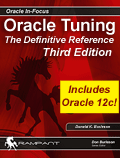 |
|
Oracle Linux - Using the "find" command to manage files
Oracle Database Tips by Donald Burleson |
The UNIX/Linux "find" command can be
used to locate any external Oracle files including database files
(dbf), alert log files, and all trace and dump files
The "which" command can also find files, and we
can easily find the location of the SQL*Plus executable:
root> which sqlplus
/u01/home/oracle/product/9.1.2/bin/sqlplus
For non-executable files, you can use the UNIX find command to locate a
particular file. Please note that in chapter 8 we extend this command to search
for all files that contain specific strings:
root> pwd
/
root> find . -print|grep ?i dbmspool.sql
./oracle/product/9.1.2/rdbms/admin/dbmspool.sql
In the example above, we cd to the root directory
(/) and issue a UNIX find command to display every file on the Oracle
server. Next, we pipe the output of the find command to grep,
which searches for the dbmspool.sql file.
Below is a script that will automatically
remove all trace files from the background_dump_destination filesystem in
UNIX.
# Cleanup trace files more than 7 days old
root> find $DBA/$ORACLE_SID/bdump/*.trc -mtime +7 -exec rm {} \;
root> find $DBA/$ORACLE_SID/udump/*.trc -mtime +7 -exec rm {} \;
root> find $DBA/$ORACLE_SID/cdump/*.trc -mtime +7 -exec rm {} \;
Note that the first part of this script (before the ?exec) displays all trace
files that are more than 7 days old.
root> find $DBA/$ORACLE_SID/bdump/*.trc -mtime +7
/u01/app/oracle/admin/janet1/bdump/janet1_arc0_25005.trc
/u01/app/oracle/admin/janet1/bdump/janet1_arc0_25173.trc
/u01/app/oracle/admin/janet1/bdump/janet1_arc0_9312.trc
/u01/app/oracle/admin/janet1/bdump/janet1_arc0_9425.trc
/u01/app/oracle/admin/janet1/bdump/janet1_arc1_14300.trc
/u01/app/oracle/admin/janet1/bdump/janet1_arc2_14380.trc
/u01/app/oracle/admin/janet1/bdump/janet1_pmon_25159.trc
/u01/app/oracle/admin/janet1/bdump/janet1_snp0_25171.trc
/u01/app/oracle/admin/janet1/bdump/janet1_snp0_8188.trc
Find recent Oracle files
This section issues the UNIX/Linux find command
to locate any Oracle trace or dump files that were created in the past day:
#******************************************************
# list the full-names of all possible dump files . . . .
#******************************************************
find $DBA/$ORACLE_SID/bdump/*.trc -mtime -1 -print >> /tmp/trace_list.lst
find $DBA/$ORACLE_SID/udump/*.trc -mtime -1 -print >> /tmp/trace_list.lst
find $ORACLE_HOME/rdbms/log/*.trc -mtime -1 -print >> /tmp/trace_list.lst
Because we know that the grep commands accepts
file names as an argument, we can use UNIX xargs command to search each file for
our Oracle table name in all sql files. In this case, we search the whole Oracle
UNIX directory structure and quickly find all scripts that reference the
dba_2pc_pending view.
root> find . -print|grep
sql|xargs grep -i dba_2pc_pending
./sql/PENDING.sql:from dba_2pc_pending
Locate recently created Oracle Linux files
The following command is useful for finding Linux files
that have been recently added to your server. Part of the job of the Oracle DBA
is monitoring the background_dump_dest and the user_dump_dest for trace files,
and purging trace files that are no longer required.
The following command lists all files that were created
in the past two weeks:
root> find . -mtime -14 -print
.
./janet1_ora_27714.trc
./janet1_ora_27716.trc
./janet1_ora_24985.trc
./janet1_ora_24977.trc
This command can easily be expanded with the xargs or
the ?exec command to automatically remove the elderly trace files:
root>
find . -mtime -14 -print|xargs -i rm \;
Note: In Windows you can use this
equivalent to the UNIX -mtime check, see
equivalent of UNIX mtime for Windows
Finding large files on Linux
The following command is very useful in cases where a
Linux file system has become full. As we may know, Oracle will hang whenever
Oracle must expand a tablespace and Oracle cannot extend the UNIX filesystem.
When a UNIX file become unexpectedly full, it may be
because Oracle has written a huge core or trace file into the UNIX filesystem.
The script below will display all files that are greaten
then one megabyte in size. Note that the size parameter is specified in
K-bytes.
root> find . -size +1024 ?print
./prodsid_ora_22951.trc
Of course, you can easily append the xargs of ?exec
command to automatically remove the large file:
root>
find . -size +1024 ?print|xargs ?i rm \;
This find command will do a "stats" on all
files in a directory structure, showing the total size of all files in the
directory. You can also incorporate the "df -k" command"
find ${START_DIR} -mtime -${DAYS} |xargs
stat -c "%s"|awk '{sum += $1}END{print sum}'
 |
If you like Oracle tuning, see the book "Oracle
Tuning: The Definitive Reference", with 950 pages of tuning tips and
scripts.
You can buy it direct from the publisher for 30%-off and get
instant access to the code depot of Oracle tuning scripts. |
